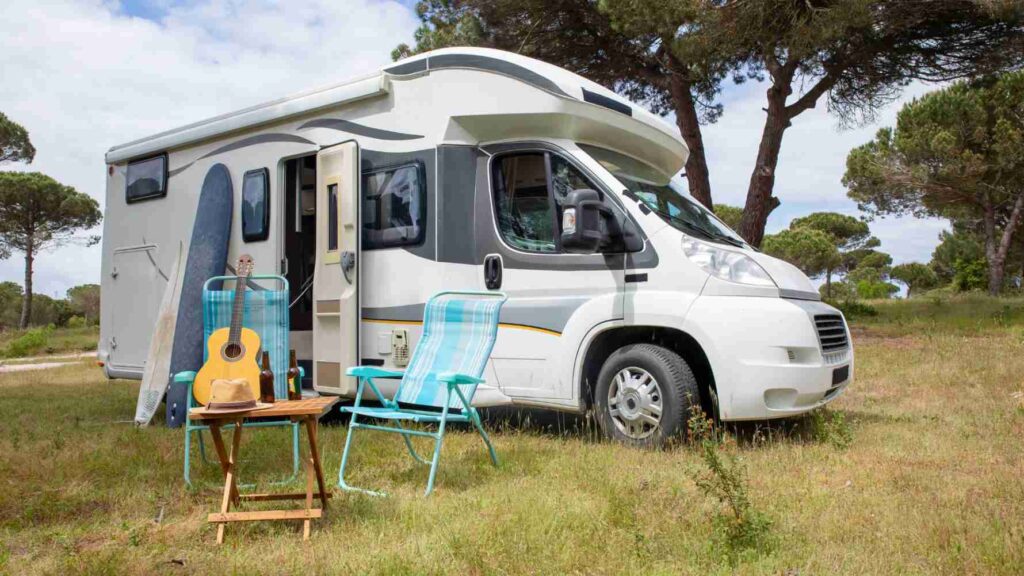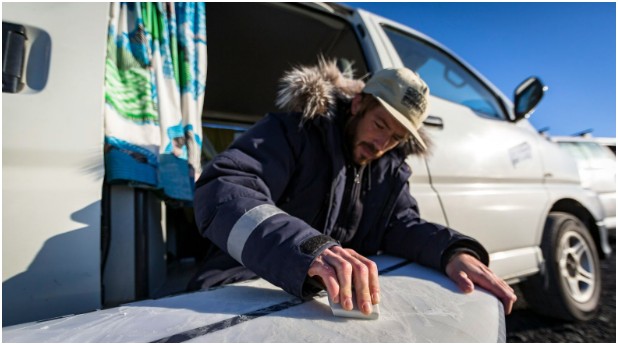If you’ve ever caught yourself asking “what is my RV worth?”, you’re not alone. Whether you’re preparing to sell, considering a trade-in, or just curious about your asset, knowing your RV’s current value can help you make smarter financial decisions.
As someone who’s been in the RV world for years, I’ve learned that RV valuation is about much more than just a make, model, and a guess. It’s a mix of research, honest evaluation, and understanding where the market stands.
Here’s how to figure out exactly what your RV is worth—and what to do once you know.
Start with Online RV Valuation Tools

Online calculators are a great starting point to get a ballpark figure. These tools pull data from nationwide RV listings, market trends, and historical pricing to give you a fast estimate.
1. J.D. Power (formerly NADA Guides)
The gold standard for RV valuations. You’ll enter your RV’s year, make, model, and any add-ons. It provides low, average, and suggested list prices. Visit JDPower RV Values.
2. Good Sam RV Valuator
A solid tool that considers market conditions and industry data. While not as customizable as J.D. Power, it’s a good second opinion. Try Good Sam RV Value Calculator.
3. RV Trader Price Check Tool
This one is helpful because it reflects what buyers and sellers are doing in real time. You can input your details and see what similar units are selling for right now. Use RV Trader’s Price Tool.
Research Listings to See Real-World Market Pricing

Online tools are helpful—but nothing beats looking at the actual RV marketplace.
- Browse Platforms Like: RVTrader, RVUSA, Camping World, Facebook Marketplace, and Craigslist.
- Set Filters: Match your RV’s specs—model year, condition, mileage, and added features.
- Look at Sold Listings (if available): Active listings show what people want—sold listings show what people paid.
Tip: Take note of how long similar listings have been sitting unsold. If it’s been listed for weeks, it might be overpriced.
Know the Factors That Affect Your RV’s Value

To get an accurate number, you’ll need to evaluate your own RV’s condition and features. Here’s what really matters:
Condition
A clean, well-maintained RV with no visible damage or odors will always get more attention and command a higher price. Fix small issues like worn upholstery or loose cabinet latches before listing.
Mileage (for motorhomes)
Lower mileage generally means less engine wear. However, maintenance matters just as much. Keep detailed service records to show care and reliability in quality improvements.
Age
Like cars, RVs depreciate quickly—especially in the first few years. After year five, depreciation slows but still continues. A newer RV typically holds more value, unless it’s been heavily used or neglected.
Brand and Model
Some manufacturers have a stronger reputation and resale value. Airstream, Winnebago, Newmar, Grand Design, and Tiffin are known to hold their worth longer than lower-end brands.
Upgrades and Add-ons
Features that can boost value:
- Solar panels and battery upgrades
- Washer/dryer units
- Tankless water heaters
- Backup cameras and navigation
- Satellite or Wi-Fi boosters
That said, over-customization can hurt value if it doesn’t appeal to the average buyer. Keep things clean, simple, and functional.
How Much Is an RV Worth Today?
If you’re asking what is my RV worth, you’re not alone. One of the most common questions I hear is how much is an RV worth right now, and the honest answer is—it depends.
The value of an RV is influenced by age, type, condition, mileage, brand, and market demand. On average, most RVs lose value quickly in the first few years, then stabilize. That’s why two identical RVs can have very different prices.
To give you a realistic idea:
-
Entry-level travel trailers may be worth $10,000–$25,000
-
Class C motorhomes often fall between $35,000–$80,000
-
Luxury Class A motorhomes can still be worth six figures
When people ask how much does an RV cost or how much do RVs cost, they’re often surprised to learn that resale value is rarely close to the original price.
Time Your Sale With the Market in Mind

Pricing doesn’t exist in a vacuum. Your RV’s value is affected by external factors—some you can control, and some you can’t.
Seasonality
Spring and early summer are peak seasons for RV interest. Families plan summer road trips, retirees start their travels, and dealerships are stocked.
Best time to sell: February–June
Slower season: Late fall and winter (unless you’re in warmer states like Florida or Arizona)
Economic Climate
When gas prices surge or inflation rises, RV sales may dip. On the flip side, in times of economic optimism, buyers may be more willing to spend on luxury or recreational purchases.
Keep an eye on fuel costs, interest rates, and national RV trends through sources like:
- RV Industry Association
- RV News
Should You Get a Professional Appraisal?
For unique, vintage, or high-end RVs, a professional appraisal might be a smart move. Certified appraisers will inspect your RV and give you a formal report that reflects both condition and market trends.
This is especially helpful for:
- Custom-built RVs
- Converted school buses
- Antique trailers or Airstreams
- High-end Class A diesel pushers
You can find certified RV appraisers through:
- National RV Appraisers Association
- Independent evaluators near you
How RV Depreciation Affects Value Over Time
RV depreciation is the single biggest factor affecting what your RV is worth. Unlike homes, RVs are depreciating assets.
Here’s a realistic RV depreciation schedule:
-
Year 1–3: 20–30% loss
-
Year 5: 30–40% loss
-
Year 10: 50% or more
The average depreciation on an RV is higher than most vehicles because RVs combine mechanical wear with living-space deterioration. This is especially noticeable in Class B RV depreciation, where compact size doesn’t always mean slower value loss.
RV Value by VIN: What It Can and Cannot Tell You
Many owners try to check RV value by VIN, hoping for an instant answer. While VIN-based tools can help identify the model and specs, they do not reflect condition, upgrades, or usage.
VIN tools work best when combined with:
-
NADA RV value estimates
-
Comparable market listings
-
A professional RV appraisal
Think of VIN valuation as a starting point, not the final word
NADA RV Value vs Blue Book Value of a Camper
The NADA RV value system is often mistaken for a true “blue book.” While there is no official blue book value of a camper, NADA fills that role in the RV market.
Here’s how they differ:
-
NADA RV value: Industry-standard baseline
-
Blue book prices for RVs: Informal term used by buyers
-
Blue book value motorhome: Usually refers to NADA data
NADA values are useful, but real-world pricing often depends on local demand and condition.
Truck Camper Depreciation Explained
Truck camper depreciation follows a slightly different curve than motorhomes. Because truck campers have fewer mechanical systems, they can retain value better—if maintained properly.
However, heavy usage and poor storage can still reduce the value of an RV camper significantly. Expect depreciation of 25–35% in the first five years.
RV Appraisal: When You Actually Need One
An RV appraisal becomes essential when:
-
Selling a high-value RV
-
Settling insurance claims
-
Estate or divorce situations
-
Financing disputes
Professional appraisals consider depreciation, upgrades, and market conditions—far more accurate than online tools alone.
Are RVs Worth It Long Term?
This is the question I always answer honestly: Are RVs worth it?
Financially, RVs are not investments. They depreciate. But in terms of lifestyle freedom, travel flexibility, and long-term use—many owners find them absolutely worth it.
If your goal is value retention, buy used. If your goal is experience, the cost often feels justified
Private Sale vs. Trade-In: What’s the Difference in Value?
Dealerships typically offer wholesale or trade-in value. This is 10–30% lower than what you could get in a private sale—but it comes with convenience.
| Selling Option | Value Received | Effort Required | Timeline |
| Private Sale | High | High | Varies |
| Trade-In to Dealer | Low–Moderate | Low | Fast |
| Consignment | Moderate | Medium | Varies |
Quick Tip: Before listing privately, clean your RV thoroughly, stage it like a mini home, take quality photos, and write a detailed, honest description.
FAQs About Valuing Your RV
1. How accurate is J.D. Power (NADA) for RV values?
It’s a good starting point, but should be paired with real-market research. Many sellers find the actual selling price is 10–20% above or below the NADA estimate.
2. Can I increase my RV’s value before selling?
Yes. Clean thoroughly, fix cosmetic issues, replace outdated fixtures, and make it road-ready. A detailed maintenance record can also boost trust with buyers.
3. How much is an RV?
RV prices range widely, from $10,000 for used trailers to $300,000+ for luxury motorhomes.
4. How much does an RV cost?
The cost depends on type, age, and features, with most RVs costing between $20,000 and $100,000.
5. How much do RVs cost on average?
Most RV buyers spend $40,000–$75,000 depending on size and class.
6. How much RV cost over time?
Beyond purchase price, expect ongoing costs for maintenance, storage, insurance, and depreciation.
7. Are RVs worth it?
RVs are worth it for lifestyle freedom, but not as financial assets.
Final Word: What Is My RV Worth? Now You Know
Determining your RV’s value isn’t a guessing game—it’s a process. Use the right online tools, do your research, evaluate your rig’s unique features, and stay tuned to the market. The more effort you put in, the better positioned you’ll be to sell—or keep—your RV with confidence.

